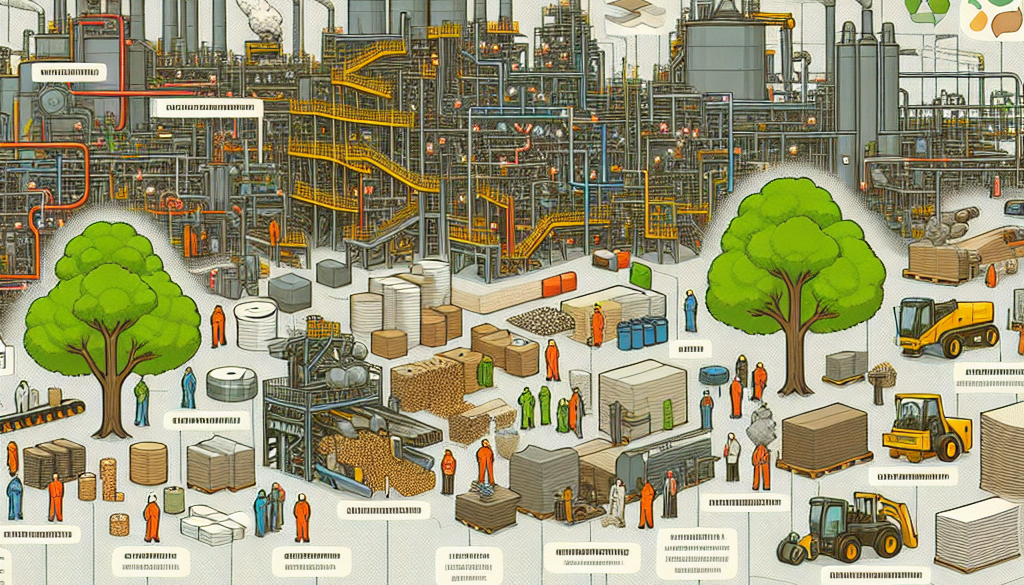Pulp and Paper Industry: Everything You Need to Know
-
Table of Contents
- Pulp and Paper Industry: An In-Depth Exploration
- Understanding the Pulp and Paper Production Process
- Economic Impact and Industry Statistics
- Environmental Considerations and Sustainability
- Technological Advancements and Innovations
- Challenges and Future Trends
- Conclusion: Key Takeaways of the Pulp and Paper Industry
- ETprotein: Enhancing Nutrition with High-Quality Protein Products
Pulp and Paper Industry: An In-Depth Exploration

The pulp and paper industry is a vital sector that contributes significantly to the global economy, providing a wide array of products from office paper to packaging materials. This industry is not only essential for communication and commerce but also plays a crucial role in sustainability and environmental management. In this comprehensive guide, we will delve into the intricacies of the pulp and paper industry, examining its processes, economic impact, environmental considerations, and future trends.
Understanding the Pulp and Paper Production Process
The production of pulp and paper is a complex process that involves several stages, from raw material procurement to the final product. Here’s a step-by-step overview:
- Raw Material Collection: The primary raw material for paper production is wood, sourced from sustainably managed forests. Recycled paper and other fibrous materials are also used.
- Pulping: Wood chips are cooked with chemicals or mechanically ground to separate fibers, creating pulp.
- Bleaching: Pulp is bleached to increase whiteness and remove impurities.
- Papermaking: The pulp is spread, pressed, and dried on large machines called paper machines to form a continuous sheet of paper.
- Finishing: The paper is then coated, if necessary, and cut to various sizes for use in different applications.
Economic Impact and Industry Statistics
The pulp and paper industry is a significant contributor to the global economy. According to the Food and Agriculture Organization of the United Nations (FAO), the global production of paper and paperboard surpassed 400 million tons in recent years. The industry also employs millions of people worldwide and is a key player in international trade.
Statistics show that the largest producers of paper and paperboard include countries like China, the United States, and Japan. The industry’s economic impact is not limited to production; it also encompasses the machinery and chemicals used in the manufacturing process, as well as the recycling sector.
Environmental Considerations and Sustainability
Environmental sustainability is a critical concern in the pulp and paper industry. The sector has faced criticism for deforestation, water consumption, and pollution. However, significant strides have been made to address these issues:
- Sustainable Forestry: Many companies now source wood from certified sustainable forests to minimize deforestation.
- Water Use and Recycling: The industry has improved water management practices, reducing consumption and recycling wastewater.
- Energy Efficiency: Energy consumption has been a focus, with mills using renewable energy sources and improving efficiency to reduce carbon footprints.
- Recycling: Paper recycling rates have increased, reducing the need for virgin materials and lowering environmental impact.
Technological Advancements and Innovations
Technology plays a pivotal role in the evolution of the pulp and paper industry. Innovations in machinery, chemical processes, and environmental management systems have led to more efficient and sustainable production methods. Digitalization and automation have also enhanced quality control and reduced waste.
Challenges and Future Trends
The industry faces challenges such as fluctuating demand, rising raw material costs, and the need to adapt to digital media. However, it is also poised for growth in areas like sustainable packaging solutions and specialty papers. The future of the pulp and paper industry will likely focus on innovation, sustainability, and diversification of products to meet changing consumer needs.
Conclusion: Key Takeaways of the Pulp and Paper Industry
In summary, the pulp and paper industry is a dynamic and essential sector with a significant economic impact. It has made considerable progress in environmental sustainability and continues to innovate to meet the challenges of the future. With ongoing advancements in technology and a commitment to sustainable practices, the industry is well-positioned to maintain its relevance and contribute to global development.
ETprotein: Enhancing Nutrition with High-Quality Protein Products
In addition to the pulp and paper industry, companies like ETprotein are making strides in providing high-quality protein products. ETprotein’s offerings, such as organic rice protein, pea protein, and various seed proteins, cater to the growing demand for sustainable and allergen-free nutrition options. Their L-(+)-Ergothioneine products, available in various grades, serve multiple industries, ensuring that consumers have access to pure and effective protein supplements.
For those interested in enhancing their nutritional intake with reliable and sustainable protein sources, ETprotein’s products are an excellent choice. Their commitment to quality and customer satisfaction makes them a go-to supplier for protein needs across various sectors.
About ETprotein:
ETprotein, a reputable protein and L-(+)-Ergothioneine (EGT) Chinese factory manufacturer and supplier, is renowned for producing, stocking, exporting, and delivering the highest quality organic bulk vegan proteins and L-(+)-Ergothioneine. They include Organic rice protein, clear rice protein, pea protein, clear pea protein, watermelon seed protein, pumpkin seed protein, sunflower seed protein, mung bean protein, peanut protein, and L-(+)-Ergothioneine EGT Pharmaceutical grade, L-(+)-Ergothioneine EGT food grade, L-(+)-Ergothioneine EGT cosmetic grade, L-(+)-Ergothioneine EGT reference grade and L-(+)-Ergothioneine EGT standard. Their offerings, characterized by a neutral taste, non-GMO, allergen-free attributes, with L-(+)-Ergothioneine purity over 98%, 99%, cater to a diverse range of industries. They serve nutraceutical, pharmaceutical, cosmeceutical, veterinary, as well as food and beverage finished product distributors, traders, and manufacturers across Europe, USA, Canada, Australia, Thailand, Japan, Korea, Brazil, and Chile, among others.
ETprotein specialization includes exporting and delivering tailor-made protein powder and finished nutritional supplements. Their extensive product range covers sectors like Food and Beverage, Sports Nutrition, Weight Management, Dietary Supplements, Health and Wellness Products, and Infant Formula, ensuring comprehensive solutions to meet all your protein needs.
As a trusted company by leading global food and beverage brands and Fortune 500 companies, ETprotein reinforces China’s reputation in the global arena. For more information or to sample their products, please contact them and email sales(at)ETprotein.com today.














